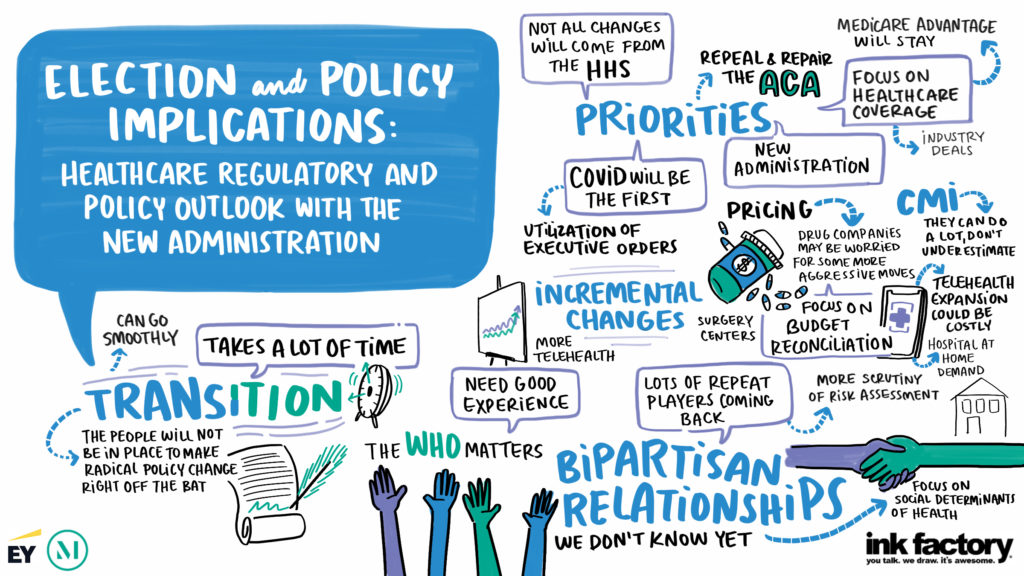The 2020 election gave Democrats the White House and control of both houses of Congress-an eleven seat majority in the House and Representatives, and a 50/50 split in the Senate with Vice President-elect Kamala Harris available to break ties. This change in the political landscape will lead to shifts in the health policy and regulatory agenda.
The panel, featuring Eric Zimmerman, McDermott Global Health Practice Lead; Brian Fortune, Senior Managing Director, Farragut Square Group; Mara McDermott, Vice President, McDermott+Consulting; Heather Meade, Principal, Health Care Policy, Washington Council Ernst & Young; and Thomas Scully, General Partner, Welsh, Carson, Anderson, and Stowe, discussed advice for investors as change comes to Washington.
Below are the top takeaways for McDermott Will & Emery and EY during the 2021 J.P. Morgan Healthcare Conference: Election and Policy Implications: Healthcare Regulatory and Policy Outlook with the New Administration, click here to access the full webinar.
Access the PDF here.
THE TRANSITION
President Biden was sworn in on January 20, 2021, and one of his first orders of business has been confirming new cabinet officials. Some key officials, such as Treasury Secretary Janet Yellen and Department of Defense Secretary Lloyd Austin, were easily confirmed in a bipartisan vote. However, others- like the nominee for Secretary of the Department of Health and Human Services, Xavier Becerra- will face challenges in a closely divided Senate.
COVID-19 RELIEF
Responding to the COVID-19 pandemic will be a high priority for the incoming administration and Congress in the early days of 2021. Expect relief efforts to continue to focus on managing the spread of disease through public health measures, vaccines and repairing the virus’ economic damage, including for providers. The administration’s announcement that it will likely extend the current public health emergency (PHE) through the end of 2021 means that waivers, like telehealth payment regulations and the hospital without walls program, will continue, which will afford stability and certainty. Executive Orders and a National Strategic Plan to address the epidemic have already been issued and we expect more guidance like this to come in the days and weeks to come.
COVERAGE AND THE AFFORDABLE CARE ACT
Expect several converging factors to keep the coverage debate front and center in 2021, including sweeping layoffs, rising healthcare costs for employers and the looming legal challenge to the Affordable Care Act (ACA). Watch for Congressional Democrats to pursue coverage expansions and shoring up the ACA in the early days of the 117th Congress.
PRESCRIPTION DRUG PRICING
Action on prescription drug pricing has been a priority for Democrats and Republicans in Congress and across administrations, but success has remained elusive. Expect a return to the bargaining table on this issue in 2021 and beyond.
MEDICARE ADVANTAGE AND PROVIDER RISK CONTRACTING
The Trump administration took a very favorable policy view toward the Medicare Advantage program, implementing year-over-year payment increases and finalizing additional flexibility for plans. At the same time, the Trump administration took a more critical view of accountable care organizations, particularly those led by hospitals and academic medical centers. Expect the Biden administration to flip this—taking a closer look at Medicare Advantage payment and regulation and a friendlier tone toward traditional players in the accountable care space. We expect Trump administration models, like Global and Professional Risk Direct Contracting, to move forward, with possible tweaks to the financial methodology.
To catch up on all of the sessions at the McDermott Will & Emery and EY during the 2021 J.P. Morgan Healthcare Conference, please click here.







